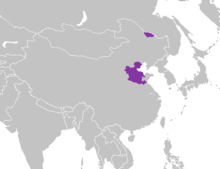Jilu Mandarin
| Ji–Lu Mandarin | |
|---|---|
| Beifang Mandarin | |
| Region | Hebei, Shandong |
|
Native speakers
|
(84 million cited 1982) 12.6% of all Mandarin |
|
Sino-Tibetan
|
|
| Language codes | |
| ISO 639-3 | – |
| ISO 639-6 | jlua |
|
Linguist list
|
cmn-jil |
| Glottolog |
Nonehuab1238 (Huabei Guanhua)
|
| Linguasphere | 79-AAA-be |
 |
|
Jilu or Ji–Lu Mandarin (simplified Chinese: 冀鲁官话; traditional Chinese: 冀魯官話; pinyin: Jì–Lǔ Guānhuà), formerly known as Beifang Mandarin "Northern Mandarin", is a dialect of Mandarin Chinese spoken in the Chinese provinces of Hebei (Jì) and Shandong (Lǔ). Its name is a combination of the abbreviated names of the two provinces, which derive from ancient local provinces. The names are combined as Ji–Lu Mandarin.
Although these areas are near Beijing, Ji–Lu has a different accent and many lexical differences from the Beijing dialect, which is the basis for Standard Chinese, the official national language. There are three dialect groups, Bao–Tang, Shi–Ji, and Cang–Hui.
The Bao–Tang dialect shares the same tonal evolution of the inner tone from Middle Chinese as Beijing Mandarin and Northeastern Mandarin. Moreover, the popularization of Standard Chinese in the two provincial capitals has induced changes in the Shi–Ji dialect causing the former to shift rapidly towards the standard language.
...
Wikipedia
